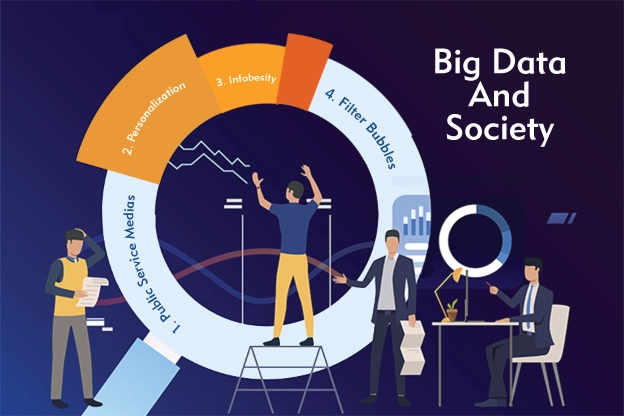Big data is no longer novel to organizations and consumers in the age of information and actionable insights. Big data has been around for a long time. Organizations produce actionable insight well-informed decisions, find patterns, and boost efficiency with big data analysis, it is officially recognized.
Big data, on the other hand, is more than that. Big data offers organizations numerous benefits and has an impact on enterprises, the workforce, and society.
Let us get started!
Big Data Impact on the Society
Big Data, like most of the revolutionary innovations currently in use, has an immediate impact on businesses. Big Data is already being embraced by entrepreneurs and early consumers in the business world. According to the Technology Adoption Cycle, this segment accounted for around 16 percent of all organizations, and with 12 percent having adopted a plan, we are on the verge of closing the gap with the remainder. The rest of the organizations, the early and late majority, and eventually the non – adopters, will embrace a Big Data strategy because when innovation has bridged the divide.
Big data offers businesses meaningful (if properly processed) and up-to-date knowledge, allowing them to make wiser and quicker decisions. Businesses can also leverage big data analytics tools to enhance organizational performance and productivity, acquire a market edge, and explore other big data utilize case possibilities.
Furthermore, with the use of big data, businesses want to enhance income by delivering a better customer experience. The basic goal of most businesses is to improve the client experience. A better business model, cheaper costs, and increased efficiency are all aims that can be reached with big data assistance.
Big Data, on the other hand, will have an impact on individual security. For consumers, society will become much more open; it will also appear as if Big Brother is always monitoring. There are numerous examples of businesses failing to respect clients’ private information or failing to be transparent about how they handled gathered data.
Consumers, Now understanding the credentials privacy of each other and knowing the world of Big Data.
Impact of Big Data on Health Care
Big data is crucial in all businesses, but it is particularly for today’s rapidly changing healthcare market. Because healthcare is so complex, big data analytics can have a wide-ranging impact. Healthcare and insurance companies alike can use big data to improve outcomes for patients in a more structured market while reducing wasteful expenses.
Big data aids in improving the consumer experience in healthcare.
Big data is a reliable data framework that helps network operators to give real-time client assistance. Having additional personal information technologies allows customer-facing employees to concentrate their expertise, whether you’re a hospital or an insurer. The support rendered is more educated, analysed, and correct across the spectrum. A healthcare customer service agent can quickly seek up answers to a patient’s condition if they have reference to that information with the necessary health information. If they don’t know the answers, they should be able to promptly refer the patient towards a more knowledgeable representative.
Because big data has an impact on organisations, which in turn has an effect on the economy, society, and big data technologies. It enjoys a never-ending cycle. Big data has boosted the amount of industry 4.0, privacy, and confidentiality in the production and healthcare industries.
Conclusion
Big data is the way organizations will operate in the future. Big data, as previously stated, not only provides insights but also has a significant impact on people, the economy, and the workforce. More jobs will be created as a result of the usage of big data, as well as new guidelines and governance structures.
However, keep in mind that every business is unique. Each has its own set of business constraints, necessitating a unique approach to big data. Organizations may reduce costs, improve or even automate business processes, simplify procedures, and enhance value proposition by appropriately utilizing the infinite potential that big data provides, as well as be industry leaders.






